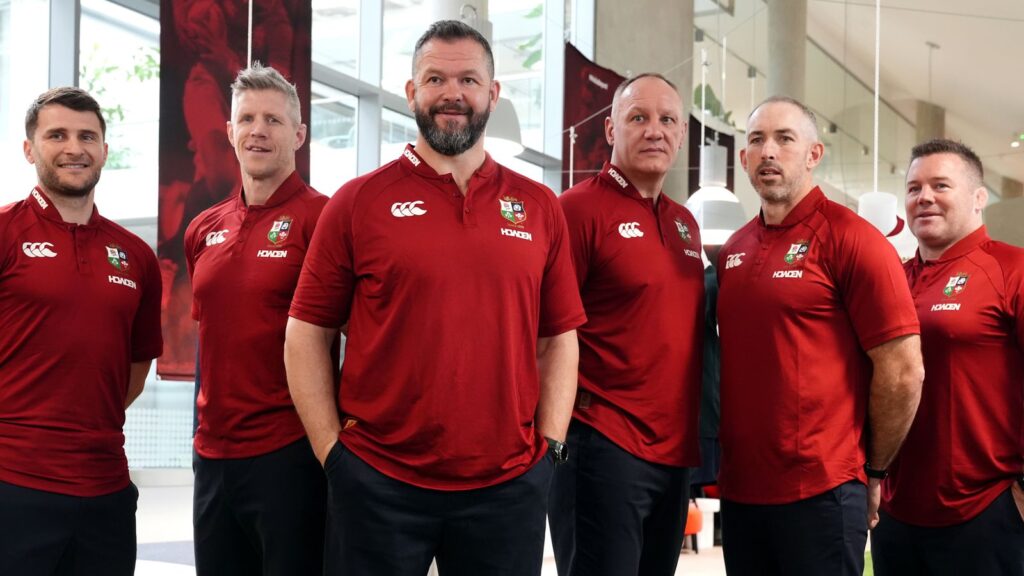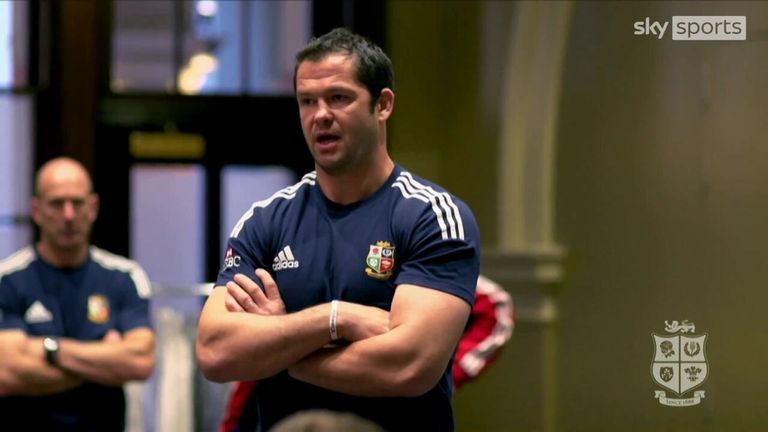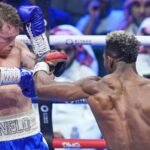This Thursday May 8, the latest iteration of British and Irish Lions squads will be confirmed, live on Sky Sports.
One of the ultimate achievements in the sport, the word most commonly associated with Lions selection by previous tourists is that it is simply the “pinnacle.”
The coaching group to lead the Lions to Australia this summer is headed up by Andy Farrell, with England senior assistant coach Richard Wigglesworth, Ireland coaching trio Simon Easterby, Andrew Goodman and John Fogarty, and Scotland forwards coach John Dalziel also involved.
We’ve spoken to each to get their ideas of what constitutes the ideal Lions player, coach, atmosphere and more…
It is a squad made up of players from four nations, and four nations who compete ferociously against one another every year at that. One which every four years travels thousands of miles to the southern hemisphere off little training time and preparation to play one of world rugby’s juggernauts: Australia, New Zealand or South Africa.
The whole concept of the British and Irish Lions remains unique in sport. It shouldn’t work, but its compelling, idiosyncratic nature means it just does. Yet, it is no easy platform to succeed on.
“People who do special things at special moments when the pressure is on,” Lions head coach Farrell tells Sky Sports when asked what characteristics sum up the ideal Lions player and what has made the best of them.
More than that sheer talent aspect and delivering at clutch moments, though, it’s a selfless trait which Farrell and others say is synonymous with the best Lions in history.
“For me, being on a couple of tours, it’s people who epitomise what a real teammate is all about,” Farrell adds.
“The dynamics of a Lions tour are extra special because of those types of people who make it that way. They’ve bought into the team first and that’s what it’s all about.
“It’s everything, and if you’re not that way, you shouldn’t be on the tour. How quickly things change from game to game, it isn’t just that it’s different schedules during the weeks, it’s doing stuff completely out of your own comfort zone in terms of how you’d normally prepare for a game.
“There will be players training in the morning when other players are getting ready to play that evening. It’s getting on a plane the next day, putting your bags into your room and then one of your bags goes off to somewhere else. It’s just mad, but great fun at the same time.
“You need good people because you need all hands on deck, everyone mucking in.”
Wigglesworth, who will likely have a key influence on kicking strategy in attack, points out the whole concept of intensive Six Nations rivalries turning from near hatred into a level of camaraderie where new teammates put their bodies on the line for one another is something only the Lions brings out.
“They’ve been knocking seven bells out of each other in the Six Nations and then you’ve got to quickly come together and park all that,” he says.
“And not just park it but become really tight and cohesive and that’s happened on the best Lions tours in the past. We want this to be one of the best, if not the best.
“You’re on the plane because you’re a great player and you have elite-level talent but I think the great Lions have great character. You need both.”
‘The human side of things on a pressurised tour is incredibly important’
Ireland scrum coach Fogarty is a figure in rugby well-known for his affable, spirited nature – essential within a professional sporting landscape where pressure and seriousness can very often take over.
Fogarty even humorously described himself as the “captain of craic” on the recent Netflix Six Nations: Full Contact docuseries – something he’s visibly mortified by when mentioned to him.
That fun aspect – in conjunction with teammateship – is something Fogarty highlights as vital.
“You need to be a proper teammate. There are loads of challenges and there’s no doubt they’re the best of the best players, but being a proper teammate, figuring things out with each other, for each other, is incredibly important.
“We want the best players to come and commit to creating the best environment in training sessions. In how we review things, how we sit down together. These things are really important so that we’re well-connected.
“There’ll be ups and downs, we’re away for a long time, there’s a lot of pressure on players. For them to be able to share the load through the group, that human side of it is incredibly important when you go on tour.
“We need to be together, and we need to be loving it together. That idea of us all in it together is incredibly important. That’s what I see for the group.
“Craic is important along the way. There’s so much pressure, and it exists, you can’t ignore it. It creates opportunities but it still is pressure, so to have moments in the day where we can do something stupid that alleviates some of the pressure is a positive thing.”
Durability and resilience are also elements pointed out as critical for the best of the best in terms of Lions performers. But always within the wider spectre of team-building and bonding being the most important.
“Guys who have an open mind, are prepared to leave their ego at the door and come in embracing the Lions the way it should be,” defence coach Easterby tells Sky Sports.
“That’s the thing for me. How quickly a player can park all the other stuff that goes on and become part of a really special group.
“He has to be tough and durable because he has to play regularly. And then all those bits we know go to making a great tourist: someone who can keep backing up training.
“It’s an individual responsibility of coming into a group of several strong personalities. Lots of really good players but understanding the strength of that group and the success of the tour will be down to individuals parking allegiances away from the Lions and buying into the Lions ethos.
“Backing up each other, supporting each other, enjoying each other’s company on and off the pitch. Those successful tours have usually been because players have connected not just on the pitch and played for each other and the Lions, but also off the pitch and enjoyed each other’s company. That’s how you start to connect and play for each other.”
Attack coach Goodman is almost identical in his response: “When you’re off the field, you’ve got to connect well.
“You’ve got to go outside your normal group that you’d usually hang out with. You’ve got to go and take time to meet new people you might not know so well, get to know them, get to know about their families. All that little stuff matters and it makes a more connected team on the field.
“Coffees and lunches out and walks along the beach and games of golf. There are so many different components of it on a tour that you get to experience.”
For forwards coach Dalziel, it’s the element of adaptability and sticking in there that stands out in terms of the best Lions:
“The unique nature of the tour is the resilience, as well as the talent and the person. Logistically, the rugby, the intensity, being in different countries, there are a lot of challenges the Lions take on.
“The players that are able to adapt the best are going to make the best Lions. That’s what makes Lions, the ability to be versatile, to adapt and to take the challenges head on that come with that.”
The ideal Lions coach? Clarity, clarity, clarity
What of the best Lions coaches then? What is it that goes into making the best to have led the most famous invitational side around?
It’s a coaching role in sport which, it’s fair to say, is far from easy to take on.
The common theme from conversations with all six coaches of the 2025 vintage, is the importance of clarity – both between coaches and to players.
So, in answer to what makes the ideal Lions coach, they said…
Farrell: “Somebody who doesn’t work in silos, who’s giving to other departments, who cares about the team and how the team performs as a whole. That’s how it has to be.
“The best atmosphere is a jovial one, but a serious one. One that just relishes absolutely everything that’s thrown at them.
“But not just that, one that thrives in that type of environment. That embraces it but enjoys it as well.”
Goodman: “Clear. Really clear and aligned as a coaching group around not only the language we use but the way we present to the players, the energy we have around the place. We’ve got to have really great energy.
“We want the boys to come in and feel how connected we are and how aligned we are as a group, because when they see that, it would be easier for them to buy into it as well. Our energy, alignment and the language we use will be big parts of that.”
Wigglesworth: “Hard one to answer but we want to give the players as much clarity as we can so that they can go and show off their obvious talents.
“It’s getting them in a really good place and confident. If we can send them out to feel confident, with clarity of what’s expected and some freedom to go and show just how good they are then we’ll be in a good space.”
Dalziel: “The ability to get the best out of the players. As the tour happens, we’re going to be in the background and it’s about the players front and foremost. It’s how we put our own beliefs and philosophies together to complement the players. It’s the collaboration between us coaches, and then between the players.
“We have the best players in the world who have input and as coaches we can learn off each other. We can learn from the players, it’s a two-way street. We’re going to be completely different in terms of teams game-to-game in the early parts of the Tour, so it’s adaptability as well.”
Easterby: “What you’d want in a player is for them to bring their own personality to the group and it’s no different from a coach. One of the iconic images of the 1997 tour was hearing Jim Telfer talk to the forwards around what they needed to do: that great Everest speech. Certainly when you see those moments and how those players responded to it.
“The Carwyn James era in the 70s, I would have been brought up on understanding what that meant to him. He’d coach in a very different way, in a shirt and tie. We might not be doing that in terms of the way we go about our job but it’s different personalities coming together and still chasing down the ultimate dream, which is winning a Test series.
“Whether that’s a player or a coach, it’s no different. You’ve got to buy into what’s important to us as a group. How quickly we do that will be the measure of the team.”
Fogarty: “There’s a clear plan, they stand for something, and that’s really important. That as a coaching group, we’re ahead of the game, so that when the players come in, it becomes clear over the first week what we stand for, and how we’re going to go about our business.
“Andy has an amazing ability to make people relax, and to get people on the same page. When you’re nice and relaxed, you can properly communicate to each other, you can fix things on the move, you build trust quite easily. Andy does those things really well. Things that are very important as we go on this journey.
“You’ve got to love it, Andy says that all the time. You’ve got to love this, and on the biggest days, this is why we do this. We want to lean in towards all the biggest challenges. It’s incredibly exciting: the opportunity that exists in the pressure to do something special, that drives me as a coach.
“I’m not stressing about what’s ahead, I’m unbelievably excited with the opportunity that’s in front of us. That’s how I’m feeling at the moment: I feel lucky.”
British & Irish Lions tour of Australia on Sky Sports
Sky Sports will exclusively show the 2025 British and Irish Lions tour of Australia, with all three Tests against the Wallabies and six warm-up matches to be shown exclusively live.















